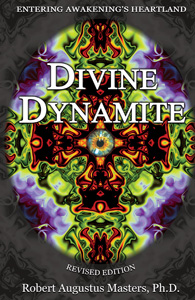Divine Dynamite
Entering Awakening’s Heartland (REVISED EDITION)(Out of print, but available through Amazon)
A collection of essays that explore and illuminate the promises, perils, and terrain of deep healing and awakening, offering savvy, sometimes poetically-infused guidance for a deeper life, a life of full-blooded awareness and integration, a life in which all things are permitted to awaken us.
With an orientation at once both psychological and spiritual, this book provides steppingstones and know-how for navigating the inevitably slippery slopes of personal and spiritual evolution. It invites us to enter the heart of our difficulties and guides us through them, providing not so much maps as well-seasoned company.
Endorsements
“This is such a powerful book! Written on the fire that melds the single heart into the underlying alchemical explosion that rises through the spine of those surrended into the great unknowing, the original fire from which we were forged. Well done!”
— Stephen Levine, author of A Year To Live and Healing Into Life and Death
"Divine Dynamite is just what it says it is — a sacred explosion. Masters transforms the spiritual landscape with the mind-bending freshness of his prose. With the dexterity of the true master, he shatters complacency and razes the familiar with startling beauty. This book embodies the constantly novel surprise that is the heart of true realization.”
— Jenny Wade, PhD, author of Transcendent Sex: When Lovemaking Opens the Veil
“Don’t expect linearity or logic from Divine Dynamite; take satisfaction in being provoked and having your ordinary understanding of reality stretched and transformed. A splendid book!”
— Stanley Krippner, PhD, coauthor of The Mythic Path
Excerpt
Forgiveness: Sacred Closure
Forgiveness is the heart’s pardon. Sacred closure.
To forgive is not to excuse or condone, but rather to cease dehumanizing and excluding from our heart our offending other or others.
When we forgive, we neither bypass nor gloss over injury, but instead embrace and embody a perspective in which injury is not given the power to obscure or diminish our compassion.
Although forgiveness might seem to some to be an act of acquiescence or weakness, it is actually an act of great power, for it not only retrieves us from the past, where we are emotionally bound to those whom we won’t forgive, but also from the future — where we’re similarly bound — thereby bringing us present, undividedly and wholeheartedly present.
Forgiveness is a radical act of love not only for the offending other, but also for oneself. In forgiving someone, we are, in so many words, telling that person, “I no longer am interested or invested in having anything damaging happen to you. No longer am I going to turn the hurt you have done me into an excuse to dehumanize or violate you. Although I may never again have or make contact with you, no longer will I keep you out of my heart, however difficult that might be.”
Thus do we disconnect in order to connect at a deeper level. We then stop feeding our resentment, realizing as we do so that it was actually feeding on us, consuming our energy and attention. Our appetite for vengeance naturally shrinks, like any other shadow, in the light of our forgiveness. Then the courtrooms of our mind are not so readily populated by us — wanting to be right no longer so easily recruits and centers us. We may still get angry, but will be far less likely to infuse it with ill-will or hatred, or let it transmute into aggression. Caring for the other becomes more important than getting even, regardless of the consequences that may be deemed fitting for whatever harm may have been done.
“Love your enemies.” This may be the most practical (and marginalized) of all of the teachings of Jesus. Rooted as it is in our capacity to forgive, it cuts through the rigidly dualistic “I” versus “you” or “us” versus “them” mentality that so easily infects and aberrates us. Loving — not necessarily liking, but loving — our enemies is a kind of radical sanity, for in loving them, in wholeheartedly wishing for their freedom from delusion, we are not only ceasing to demonize them, but are also aligning ourselves with their healing. Their healing — our healing.
If our enemies were to find and embody their innate happiness, if they were freed from their suffering, if they were to heal, then they would no longer be motivated or driven to harm us. Is there a more potent and user-friendly catalyst for disarmament than forgiveness?
Implicit in the practice of forgiveness is the willingness to place ourselves — and not just intellectually! — in our offending others’ shoes and skin, to the point where they are no longer “other,” but rather only us in our less appealing facets.
Forgiveness does not depend upon what the offending other does.
That is, we don’t have to wait for that person to make amends. (And, at the same time, it is essential to realize that we do not have to forgive until we are truly ready to do so — to forgive prematurely is of no more use than putting off the forgiveness of which we are capable.) Sometimes we may be so righteously caught up in waiting for and expecting our offending others to make amends or to say that they’re sorry, that we don’t notice that we are being held hostage by our expectations of them.
If I refuse to forgive you until you “deserve” it, then I am simply punishing you, keeping myself negatively bound to you, or to the storyline with which I associate you.
If I won’t forgive you until you have “earned” it, then I am keeping myself, however subtly, a victim of what you’ve done to me. And, if I am getting something out of staying in my “wounded” role — such as having a “valid” reason for not taking more responsibility for where I’m at in my life — I am likely going to continue to postpone forgiving you.
In the process of forgiving, we may have to, at least some of the time, reframe the harm-doing we have suffered. Perhaps the pain inflicted on us by our offending others has actually been of genuine benefit to us; perhaps we needed to be hurt, disappointed, betrayed, or left; perhaps we needed to learn something that could not be learned without being treated as we were treated by our offending others. This, of course, does not mean that their actions should therefore be condoned or praised, but that they be viewed from a perspective that’s not rooted in an eye-for- an-eye morality.
Then we can clearly recognize such harm-doing as part of us. What I condemn in you also exists in me (and in everyone else), and there’s no way that it’s going to be healed if I persist in treating it as something alien to me.
None of this is to say that forgiveness is an easy practice. For example, the path to forgiveness may initially be — and may need to be — paved with hatred. We may need to feel and fully express our hate for another before we can even approach forgiving that person (as is often the case with those who have been raped). This, however, doesn’t mean that we have to literally act out, or even share, such dark feeling with our offending other or others. If we can give our hate sufficiently free rein and voice, and just the space to be, in a safe environment — like that of good psychotherapy — we’re not only going to feel, through our rage-releasing, a much needed sense of empowerment, but we’re also bound to get to what underlies our hate, so that we can fully feel our hurt and thereby move through it.
And at the heart of that hurt is not more hurt, but a love that cannot help but forgive.
This love is self-radiant, effortlessly ego-transcending, simultaneously innocent and wise. It forgives us our trespasses, our forgettings of the Sacred, our stupidities large and small, and it does so instantaneously. It does not make a problem out of our mistakes. When we allow ourselves to house — and ultimately to be — such love, we do not see errors, but only incarnation’s fleshdance in sacred transparency. Which is but the shortest of steps to remembering with our whole being What- Matters-Most.
Sometimes the process of forgiveness may seem to break our heart, but it is only the armoring around our heart that breaks. Or melts. Forgiveness brings us in out of the cold, potently reminding us of who we really are.
When we choose to forgive, we are entering the morality of the Divine. When we choose to forgive, we deepen our intimacy with the Beloved.
Forgiveness is an act of real power. It is the essence of true kindness.
May we all embody it.

